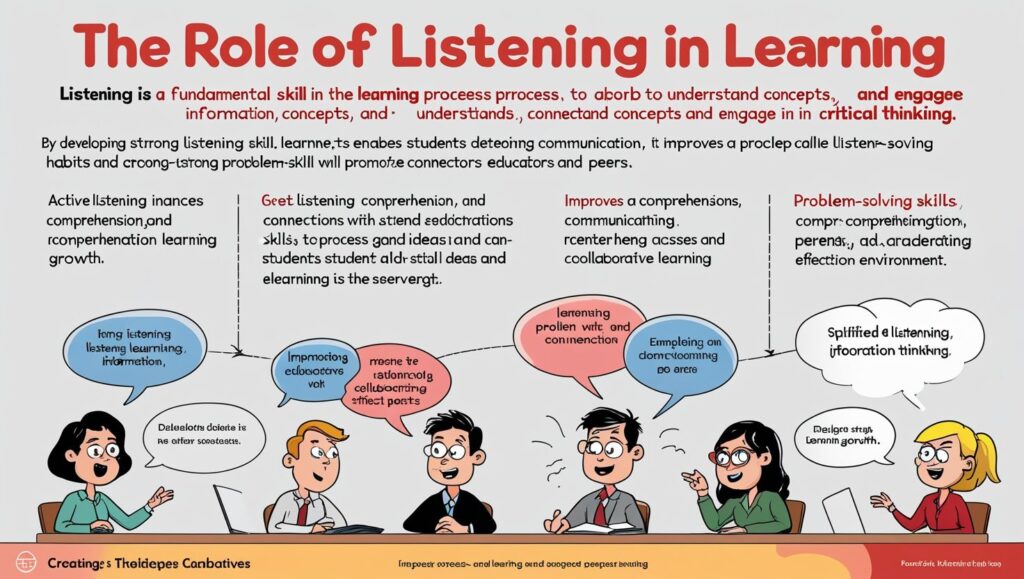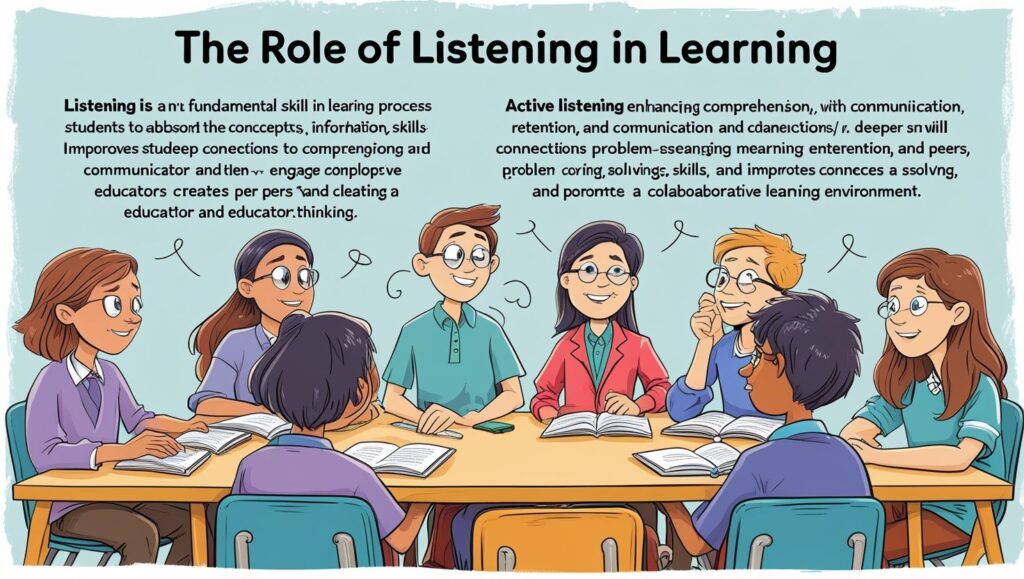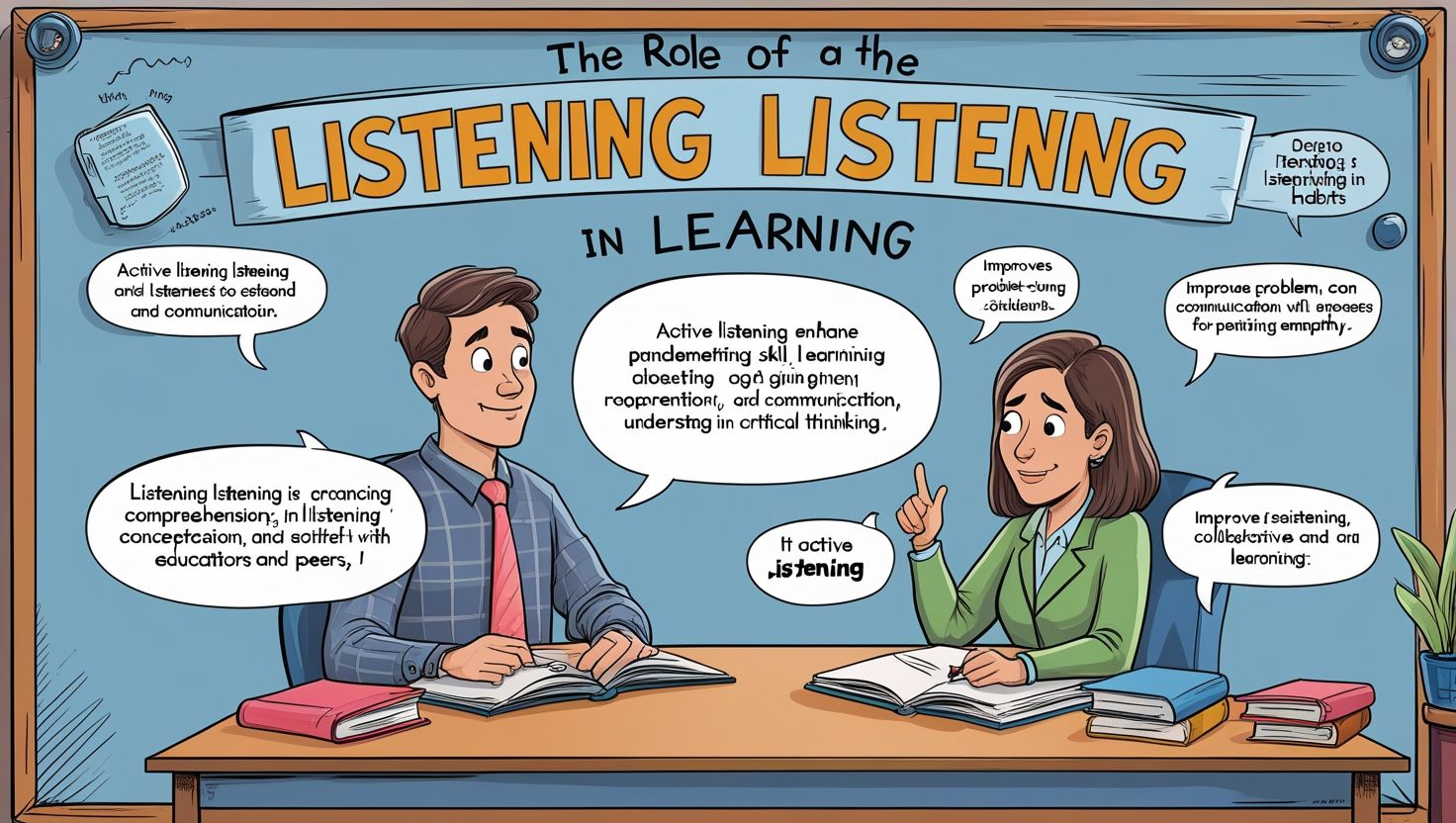The role listning for learning, Listening is one of the most fundamental skills in the learning process. It serves as a bridge between information and understanding, enabling individuals to absorb, process, and retain knowledge effectively. In educational settings, listening plays a critical role in facilitating communication between teachers and students, fostering collaboration, and enhancing comprehension. This article explores the importance of listening for learning, its impact on academic success, and strategies to improve listening skills.
The Importance of Listening in Learning
Listening is more than just hearing words; it involves actively engaging with the speaker, interpreting their message, and responding appropriately. In educational contexts, listening is essential for understanding lectures, participating in discussions, and completing assignments. Research has shown that students who actively listen in class are more likely to grasp complex concepts, retain information, and perform better academically (Bodie, 2012). Listening also promotes critical thinking, as it requires learners to analyze and evaluate the information being presented.
Moreover, listening fosters empathy and collaboration, which are vital for group work and peer learning. When students listen to their peers, they gain new perspectives and insights, enriching their learning experience. Teachers, too, benefit from listening to their students, as it helps them identify areas where learners may need additional support. In this way, listening creates a dynamic and interactive learning environment that benefits both educators and students.
The Impact of Listening on Academic Success
Academic success is closely tied to effective listening skills. Students who listen attentively are better equipped to follow instructions, complete tasks accurately, and engage in meaningful discussions. A study by Janusik (2010) found that students with strong listening skills achieved higher grades and demonstrated greater academic confidence. This is because listening enables learners to process information more efficiently, reducing the likelihood of misunderstandings or errors.
Listening also plays a crucial role in language acquisition. For students learning a second language, listening is often the first step in developing fluency. By listening to native speakers, learners can improve their pronunciation, vocabulary, and grammar. This is particularly important in today’s globalized world, where multilingualism is increasingly valued.
Furthermore, listening contributes to the development of soft skills such as communication, teamwork, and problem-solving. These skills are essential for success not only in academia but also in the workplace. Employers often cite listening as one of the most desirable qualities in job candidates, as it enables effective collaboration and decision-making (Kluger & Zaidel, 2013).

Barriers to Effective Listening
Despite its importance, many students struggle with listening effectively. Common barriers include distractions, lack of interest, and poor listening habits. In a world dominated by technology, students are often bombarded with notifications and other distractions that divert their attention away from the speaker. Additionally, some learners may find it challenging to stay focused during lengthy lectures or complex discussions.
Another barrier to effective listening is the tendency to interrupt or formulate responses before the speaker has finished. This prevents learners from fully understanding the message and can lead to miscommunication. Cultural differences can also pose challenges, as individuals from different backgrounds may have varying communication styles and expectations.
Strategies to Improve Listening Skills
Improving listening skills requires conscious effort and practice. One effective strategy is active listening, which involves giving the speaker your full attention, maintaining eye contact, and providing feedback. Active listening also includes asking questions and paraphrasing the speaker’s message to ensure understanding (Weger et al., 2014). This not only enhances comprehension but also demonstrates respect and engagement.
Another strategy is to minimize distractions. Students can improve their listening by turning off electronic devices, sitting in a quiet environment, and focusing on the speaker. Taking notes during lectures or discussions can also help learners stay engaged and retain information more effectively.
Educators can play a key role in fostering listening skills by creating an inclusive and interactive classroom environment. This can be achieved by incorporating group discussions, role-playing activities, and multimedia resources into lessons. Teachers should also encourage students to ask questions and express their thoughts, as this promotes active participation and critical thinking.
The Role of Technology in Enhancing Listening Skills
Technology has revolutionized the way we learn, and it can also be a powerful tool for improving listening skills. Online platforms, podcasts, and language-learning apps provide learners with access to a wealth of audio resources that can enhance their listening abilities. For example, language learners can use apps like Duolingo or Rosetta Stone to practice listening to native speakers and improve their comprehension.
However, it is important to use technology mindfully. While it offers numerous benefits, excessive reliance on digital devices can lead to passive listening and reduced attention spans. Educators and students should strike a balance between traditional and digital learning methods to maximize the benefits of both.

Conclusion
Listening is a cornerstone of effective learning, enabling individuals to absorb, process, and apply knowledge. It plays a vital role in academic success, language acquisition, and the development of soft skills. Despite the challenges posed by distractions and poor listening habits, there are numerous strategies that students and educators can employ to improve listening skills. By fostering active listening, minimizing distractions, and leveraging technology, learners can enhance their ability to listen effectively and achieve their full potential.
References
- Bodie, G. D. (2012). Listening as positive communication. In T. Socha & M. Pitts (Eds.), The positive side of interpersonal communication (pp. 109–125). Peter Lang.
- Janusik, L. A. (2010). Listening pedagogy: Where do we go from here? International Journal of Listening, 24(1), 21–30.
- Kluger, A. N., & Zaidel, K. (2013). Are listeners perceived as leaders? International Journal of Listening, 27(2), 73–84.
- Weger, H., Castle Bell, G., Minei, E. M., & Robinson, M. C. (2014). The relative effectiveness of active listening in initial interactions. International Journal of Listening, 28(1), 13–31.

9 thoughts on “The Role of Listening for Learning”
Comments are closed.